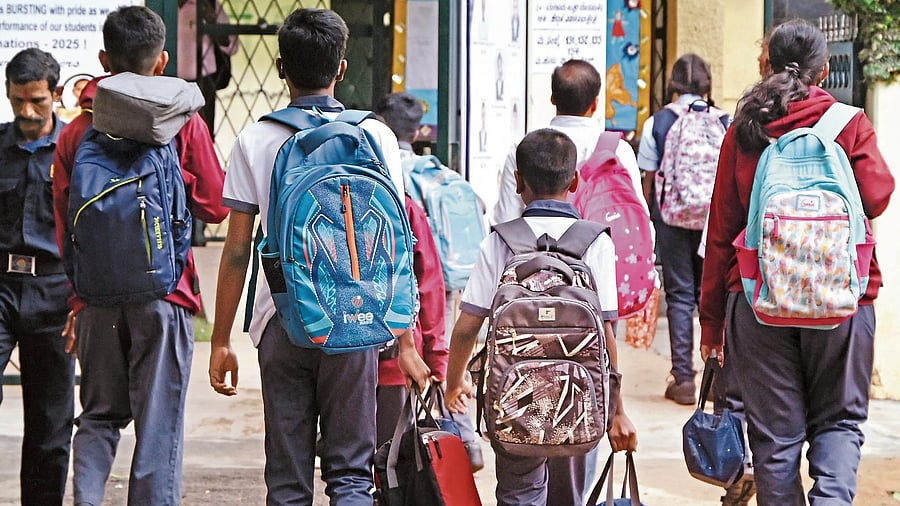
Parents complain that high school fees exclude transportation, books, and uniforms.
Credit: DH Photo/B K Janardhan
Two viral posts have reignited the debate over the spiralling cost of private education in Bengaluru. On Friday, a Reddit user shared a preschool’s annual fee of over Rs 1.85 lakh, asking if it was “reasonable”. On Sunday, a post on X highlighted the yearly fees at an international school: Rs 7.35 lakh for Class 1, rising up to Rs 11 lakh for Classes 11 and 12. The user wrote that even an IT couple earning Rs 50 lakh a year might struggle to afford such a school for two children.
The Associated Managements of English Medium Schools in Karnataka (KAMS) finds blanket criticism unfair. Its general secretary D Shashi Kumar says, of over 5,000 private schools in Bengaluru, only 0.5% charge Rs 5 lakh or more. About 90% charge Rs 30,000-50,000, 5% are in the Rs 50,000-1.5 lakh range, and the rest between Rs 1.5 lakh and Rs 5 lakh. In Bengaluru, a fee range of Rs 75,000 to Rs 1.25 lakh is “reasonable for schools offering well-rounded facilities and services”, he adds. But he blames parents for opting for expensive schools as a ‘status symbol’, and for blindly equating higher fees with better education.
Kumar adds that private schools have no cap on fees but must limit their surplus profits to 15%. However, B N Yogananda, president of the Karnataka Private School College Parents Association Coordination Committee, says the process for fixing the fee structure is not transparent. “Twenty-one states have fee determination committees, but lobbying in Bengaluru has stalled the plan here. Schools must submit the fee structure to these committees to verify they match per-child expenditure,” he says.
Location matters
Besides paying power, the choice of school also depends on location, pedagogy, and seat availability, parents say.
Kathak teacher and actor, Manasa Joshi, couldn’t find a “decent preschool” under Rs 1.5 lakh within 5 km of her home in Padmanabhanagar. “Cheaper ones were just halls in someone’s house,” she says. Her daughter is two years and seven months old. She now sends her to a Montessori school that charges Rs 1.8 lakh, excluding travel.
A Yeshwanthpur security guard is “forced” to pay Rs 50,400 towards his Class 7 son’s private school fee as the government school near his home is “always full”.
Entrepreneur Suresh (name changed) moved to Gunjur, near Varthur, because the area is a hub for IT firms and schools. “I want a school within a 5-10 minute drive so my daughter isn’t stuck in a school bus for hours,” he says. But he says all the “good” primary schools in the vicinity charge above Rs 2.5 lakh. To cut costs, he plans to admit his daughter directly to Class 1, skipping LKG and UKG. “She will continue at her current daycare. The fee is covered by my wife’s company,” he adds.
A school teacher notes that some migrant families stretch their budgets to afford international schools that don’t mandate Kannada as a second language. With their transferable jobs, they feel the local language offers little long-term value to their child’s education.
Many parents say that beyond recommendations from friends, colleagues, and neighbours, there’s no reliable way to assess a school’s quality — like an independently reviewed dashboard. As a result, most end up choosing the same few schools or those in a similar fee range, assuming that’s the “Bengaluru standard”. Some say the cost hurts because, despite paying “so much”, they are still unhappy with teaching quality. These concerns have led couples to choose homeschooling, delay having kids, have only one, or none at all.
‘Exclusionary environments’
Parents are calling for a cap on school fees, especially in lower classes. A parent from Jalahalli objects to tuition fee hikes of 10-15% every alternate year. Her daughter’s Class 6 fees of Rs 2.64 lakh accounts for 20-25% of household expenses. Another parent criticised new-age schools for profiteering, recalling how he had to pay a non-refundable admission fee upfront for pre-nursery, LKG, and UKG. A C V Raman Nagar resident fears that unchecked fees can create exclusionary environments where children lose the chance to interact with peers from diverse backgrounds.
‘Definite costs’
Prarthana Gupta, who runs a south Bengaluru academy, says private schools have many “definite costs”, with rents and teachers’ salaries being the biggest. Counselling services, extracurricular activities, and annual renewals of government-mandated permits add to the burden. Kumar of KAMS says the set of over 40 government compliances cost Rs 15-30 lakh in the first year. Despite perceptions, Prarthana says many schools aren’t profitable; hers broke even only after 15 years and is running slightly under capacity.
Nooraine Fazal, founding managing trustee of Inventure Academy, an international school in Whitefield, says schools should disclose a projection of fees from KG to Class 12 to help parents decide if a school is fit for them. But she emphasises that good education comes at a cost. “We spent Rs 1.5 crore on teacher training and development last year,” she says. And it was their corpus fund, she notes, that helped them get through the pandemic without layoffs.